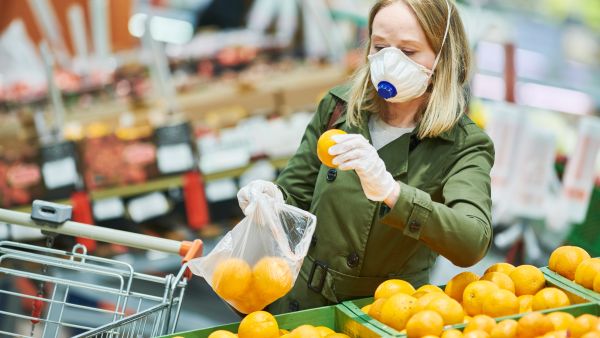Food security has emerged as one of the most important issues after world governments started closing their borders forcing imports and exports to halt or work at the very minimum capacity.
INSPIRE MIDDLE EAST | Amjad Alkhal grows lettuce in the desert.
— euronews (@euronews) September 26, 2018
Using alternative agricultural systems has saved him up to 90% of the water he would have used farming with traditional methods ??
Find out more in this report by @SalimEssaid ➡ https://t.co/tDBtrPEKB1 pic.twitter.com/yvjKKCLL1d
In our region, agriculture has for decades been pushed back on the agenda, while more modern investments have been encouraged, but now as we face the strongest global shake since WWII, it's time to revise policies and re-set priorities.
During months of home-stays across the globe and while world economies started to meltdown, the most important demands that remained high were limited to medical services and food.
Governments rushed to assure citizens that they have plenty of food products that will keep them secure during the outbreak, assuming it was going to end as the weather got warmer.
However, doctors and experts are warning that humanity might have to live with the Coronavirus for months if not years, until an effective drug or vaccine is found, which pressures policymakers to face the question of long-term food security.
While plans discussing sustainable food production had for years referred to climate change as the possible threat we have to be prepared for, COVID-19 took us by surprise and is now dictating a new reality where fears of food shortages are at their highest, particularly in non-producing countries.
Open digital ecosystem for #smartagriculture: NEVONEX makes a farmer's agricultural machinery smart & simplifies work processes. Various partners offer apps which provide a pool of expert knowledge & can be used directly on the machine: https://t.co/SzpjhXDM1N #IoT #Agritechnica pic.twitter.com/ttXiRWasOF
— BoschGlobal (@BoschGlobal) November 12, 2019
More than ever before, governments, especially in the Middle East and GCC countries, need to prioritize the food sector, in order for them to support their communities' sense of resilience facing the current paramedic and potential future crises despite import disruptions.
Policymakers now need to consider adopting alternative agricultural practices, smart ones supported by high-tech and are capable of revolutionizing the whole industry, even in the most deserted environments.
In North America and Europe, the agricultural sector is facing lots of risks related to the shortage of skilled labor, which shouldn't be an issue in our part of the world, where hundreds of thousands of young people are looking for jobs to make a decent living.
Food security is a serious challenge. According to WFP more than 47 million on the Middle East will suffer the lack of food. This include war torn countries such as Lybia, Syria and Yemen. An international plan and action will soon be needed. @WFP_MENA @WFP_AR #WFP #foodsecurity https://t.co/kQcMwgYPn9
— Wisam AL-QAISI | وسام القيسي (@Wisam_Al_Qaisi) May 13, 2020
In addition to supporting new farming practices, governments should launch several initiatives at the national level to encourage investments in both farms and the food production industry.
Moreover, governments should work with legislators on serious decisions to relax taxes and fees on purchasing lands, building factories, and obtaining technological equipment. This could, in turn, help businesses' capacities to produce higher-quality foods, hire more workers and gradually expand their scope of work, so they increase their products' competitiveness with items exported from other countries.
Finally and in light of recent lockdowns imposed by the novel Coronavirus, it's important for any future food-related project to utilize automation as much as possible, so operations are continued even when the presence of human workforce is disrupted.
Recently, the UAE has started to take immediate action to boost its food industry. The Minister of State for Food Security Mariam Bint Mohammed Saeed Hareb Al Mheiri, announced that "the UAE is supporting more than 40k local farms and is raising local production by 100 thousand tons to increase the strategic stock and ensure the availability of the main food products in all markets."
Governments will focus on adopting modern agricultural technologies and utilizing renewable natural resources in food production.#UAE #COVID19 #Sustainabilityhttps://t.co/vnvoUM9Scn
— Al Bawaba Business (@AlBawabaBiz) May 13, 2020
Also, the Abu Dhabi Developmental Holding Company (ADQ) has acquired a 50% stake in Al Dahra Holding Company, which specializes in animal feed and essential food commodities.
Times like these are the perfect chance for developing nations to turn challenges into opportunities, especially ones that boost their economic and political independence and prepares them for even harsher future crises the world might not be properly warned of.







